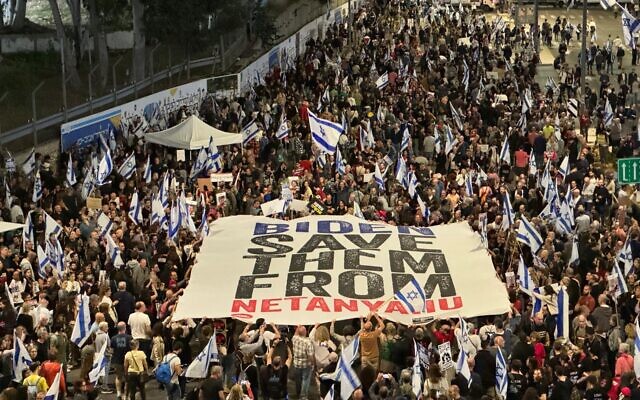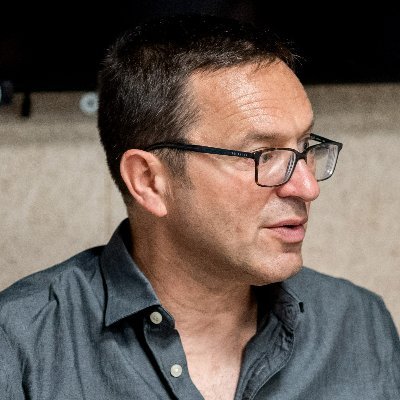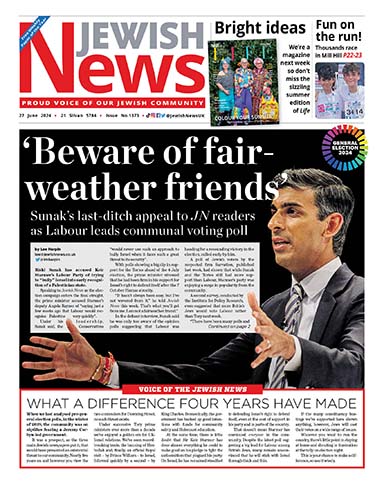OPINION: Israel faces not just a two-front war, but Benjamin Netanyahu’s government
At a time of greatest need, Israel finds competent leadership at its most lacking

In the past few days the focus of the conflict in Israel has shifted from the South to the North. Fields in the Galilee are ablaze as a result of Hezbollah missiles launched from Lebanon. The growing exchange of fire across the border is extremely dangerous and could erupt into a full-blown conflict.
A war with Hezbollah would be devastating. The Iranian-backed organization has in excess of one hundred thousand missiles – some highly sophisticated – ready to be launched at Israel. Its fighters, numbering tens of thousands, are battle-hardened and highly-trained.
This would fully open a two-front war for Israel as the IDF continues to fight (at a reduced tempo) in Gaza.
But the dual threats that Israel faces on opposite sides of the country are compounded by another critical factor that it faces from within: the presence of Benjamin Netanyahu’s government.
At a time of its greatest need, Israel finds competent leadership at its most lacking.
Bibi Netanyahu may be the country’s longest serving Prime Minister but he is distinctive from the others who have held the office in many notable ways. David Ben Gurion, Israel’s first leader, knew that the viability of the young nation depended upon the integrity of its internal institutions, along with its international standing.
He nurtured Israel from fragile independence to become a united and respected nation. Menahem Begin, the first Likud Prime Minister, was a strident defender of the country as a whole, despite his reputation in earlier years as a right wing rabble rouser. Begin respected Israel’s democratic institutions throughout his premiership, and when faced with the loss of hundreds of troops during the first Lebanon War, he retreated from public life.
Yitzhak Rabin served his country as the IDF Chief of Staff during the Six Day War and then twice as Prime Minister. In his latter premiership he became a warrior for peace in brokering the Oslo Accords. He was murdered for his courage at the hands of a right-wing religious extremist.

Bibi lacks all the qualities exemplified by his predecessors. He sees the country as serving his interests rather than the other way around, and is overseeing a fracturing of Israeli society from within while trashing its standing on the international stage.
Unlike Golda Meir who resigned eight months after the disastrous Yom Kippur War, Netanyahu is hanging onto power at all costs eight months after this war began. He is fuelled by a desire to avoid a trial on corruption charges that would follow his exit from political office.
In the initial weeks following Hamas’s murderous attacks on October 7th Netanyahu sought to shift responsibility onto the army and intelligence agencies for the catastrophic failures of that day. Israel had just begun its war in Gaza to hunt down Hamas’s leadership and recover the hostages, but Bibi was more concerned with preserving his own position.
Netanyahu is desperate to erase from public memory that it was his policy of strengthening Hamas in Gaza by allowing in huge amounts of money from Qatar and elsewhere, that enabled the organisation to prepare for October 7th.
Bibi boasted in the months and years before the attack that with Hamas contained in Gaza, and the Palestinian Authority weakened in the West Bank, all was good for Israel.
Netanyahu is also keen to make people forget the chaos and division he sowed prior to October 7th. He spent much of last year trying to force constitutional change, to undermine the judicial system in a sly power grab for power. This brought hundreds of thousands of Israelis onto the streets in protest.
Netanyahu’s policies lie in tatters, and he is now embracing the most extreme elements within Israeli society to retain power. His government consists of political minions from his own Likud Party, supported by far-right Jewish supremacists and the ultra-orthodox parties.
This has meant handing over control of the police to Itamar Ben Gvir – a convicted racist thug, and supporting a law to permanently exclude ultra-orthodox men from the draft at a time when other Israelis are fighting and dying in Gaza.
Netanyahu’s desire to hold onto power is becoming ever more desperate with the passing days. Most recently he disbanded the mini-war cabinet that had been overseeing the conflict after the resignations of leading opposition Knesset members Benny Ganz and Gadi Eisenkot.
He is now concentrating more power around himself while also using Itamar Ben Gvir’s control over the police force to violently crack down on growing protests on the streets of Israeli towns and cities.
Just when Israel needs to be united, it finds itself torn apart by Bibi’s misrule.
Nothing is sure about what will happen now, in Gaza, in the North of the country and within. But one thing is for certain, that with Benjamin Netanyahu in power, Israel’s enemies get stronger and the country becomes weaker.
The fight for Israel’s future is now and the first step must be to oust Netanyahu.
- Richard Miron is a former BBC journalist and former spokesman for the UN Secretary General’s Middle East Envoy

Thank you for helping to make Jewish News the leading source of news and opinion for the UK Jewish community. Today we're asking for your invaluable help to continue putting our community first in everything we do.
For as little as £5 a month you can help sustain the vital work we do in celebrating and standing up for Jewish life in Britain.
Jewish News holds our community together and keeps us connected. Like a synagogue, it’s where people turn to feel part of something bigger. It also proudly shows the rest of Britain the vibrancy and rich culture of modern Jewish life.
You can make a quick and easy one-off or monthly contribution of £5, £10, £20 or any other sum you’re comfortable with.
100% of your donation will help us continue celebrating our community, in all its dynamic diversity...
Engaging
Being a community platform means so much more than producing a newspaper and website. One of our proudest roles is media partnering with our invaluable charities to amplify the outstanding work they do to help us all.
Celebrating
There’s no shortage of oys in the world but Jewish News takes every opportunity to celebrate the joys too, through projects like Night of Heroes, 40 Under 40 and other compelling countdowns that make the community kvell with pride.
Pioneering
In the first collaboration between media outlets from different faiths, Jewish News worked with British Muslim TV and Church Times to produce a list of young activists leading the way on interfaith understanding.
Campaigning
Royal Mail issued a stamp honouring Holocaust hero Sir Nicholas Winton after a Jewish News campaign attracted more than 100,000 backers. Jewish Newsalso produces special editions of the paper highlighting pressing issues including mental health and Holocaust remembrance.
Easy access
In an age when news is readily accessible, Jewish News provides high-quality content free online and offline, removing any financial barriers to connecting people.
Voice of our community to wider society
The Jewish News team regularly appears on TV, radio and on the pages of the national press to comment on stories about the Jewish community. Easy access to the paper on the streets of London also means Jewish News provides an invaluable window into the community for the country at large.
We hope you agree all this is worth preserving.





















